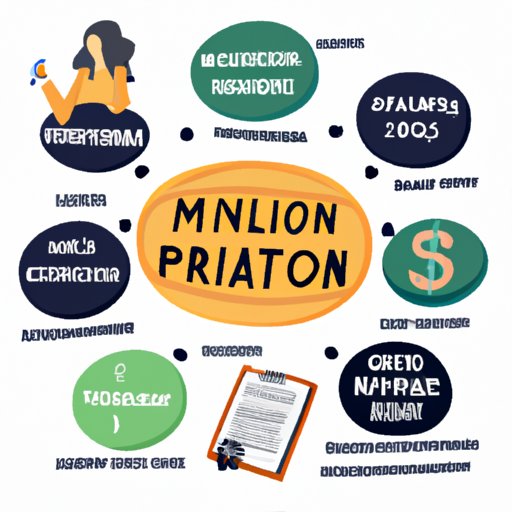
I. Introduction
Becoming a millionaire is a common financial goal for many people. Financial independence offers the opportunity to live life on your terms and provides peace of mind. However, becoming a millionaire doesn’t happen overnight. It takes consistent effort, planning, and hard work. This article aims to provide practical tips and actionable steps towards achieving financial independence and becoming a millionaire.
II. Setting and achieving financial goals
Setting and achieving financial goals is a fundamental step towards becoming a millionaire. It’s essential to have a roadmap to follow, as it helps to keep motivation high and ensures you stay on track. Financial goals can be both short-term and long-term and can include:
- Saving for an emergency fund
- Paying off high-interest debt
- Maximizing retirement savings
- Investing in real estate
- Starting your own business
Once you have identified your financial goals, the next step is to break them down into actionable steps. Creating a plan will help you stay accountable and track your progress towards achieving your goals. This plan should include specific steps, timelines, and deadlines.
III. Building a diversified portfolio
Building a diversified portfolio is an important step towards financial independence. A diversified portfolio is a collection of investments across various asset classes to spread out risk. A well-diversified portfolio includes both long-term and short-term investment vehicles such as:
- Stocks and bonds
- Real estate mutual funds
- ETFs (Exchange-Traded Funds)
- Index funds
- Commodities
When choosing investments, it’s important to consider your risk tolerance, financial goals, and investment timeline. A financial advisor can help you select investments that fit your specific profile. It’s important to regularly monitor and rebalance your portfolio to adapt to changes in the market and your financial situation.
IV. Saving and budgeting
Saving and budgeting are habits that are crucial to achieving financial independence. Saving aims to accumulate funds over time, while budgeting helps to ensure that you’re spending within your means. By creating a budget and sticking to it, you can develop a savings plan that works for your lifestyle. Some tips for effective saving and budgeting include:
- Automate your savings by setting up automatic transfers to your savings account
- Track your spending with tools such as budgeting apps
- Reduce expenses by cutting unnecessary costs such as subscriptions or eating out frequently
- Maximize savings by contributing to tax-advantaged accounts such as 401(k) and IRA accounts
Effective saving and budgeting habits can gradually accumulate wealth, and help you stay on track towards your financial goals.
V. Starting a business
Starting a business can be a great way to increase earning potential and build wealth. However, it’s essential to consider the potential risks and benefits before taking the plunge. Some tips for starting a successful business include:
- Identify a market need or niche to fill
- Write a business plan and conduct market research
- Secure funding through investors or business loans
- Build a strong team and foster professional relationships
Starting a business can be a challenging process, and it’s essential to be patient and know your limits. However, with dedication and proper planning, it can be a viable way to achieve financial independence.
VI. Continuing education and professional development
Continuing education and professional development are essential for staying competitive and building income potential. There are numerous ways to enhance knowledge and skills, including:
- Going back to school for additional degrees or certifications
- Taking online courses in areas related to your profession
- Attending industry conferences and networking events
- Building a mentorship or advisory relationship with an expert in your field
Professional development and networking can create new opportunities and help you stay relevant in a rapidly changing job market.
VII. Minimizing debt
Debt can hinder financial progress, making it challenging to achieve financial independence. It’s essential to develop a plan for managing debt and staying debt-free. Some tips for minimizing debt include:
- Pay off high-interest debt first, such as credit card debt
- Create a budget and track spending to avoid unnecessary expenditures
- Consolidate student loans or other high-interest debt
- Consider professional financial advice to help formulate a plan for managing debt
Minimizing debt is essential for building long-term financial security.
VIII. Considering alternative income streams
Exploring alternative income streams can provide a cushion for times of financial stress and help diversify income sources. Some examples of alternative income streams include:
- Investing in real estate and collecting rental income
- Starting a side business or freelance work
- Selling products online through platforms such as Etsy or Amazon
- Participating in the gig economy through services such as Uber or Airbnb
Exploring alternative income streams can provide additional income and help build long-term financial security.
IX. Conclusion
Becoming a millionaire is possible with hard work, dedication, and smart financial planning. This article covered practical tips for achieving financial independence, including setting and achieving financial goals, building a diversified portfolio, saving and budgeting, starting a business, continuing education and professional development, minimizing debt, and considering alternative income streams. Remember that every step counts towards achieving financial goals, and with perseverance, anyone can work towards becoming a millionaire and achieving financial freedom.





